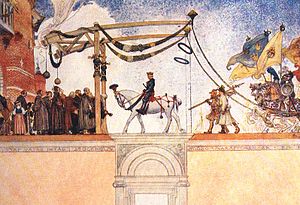- Conquest of Stockholm
-
Conquest of Stockholm Part of Swedish War of Liberation 
The Entry of Gustav Vasa into Stockholm
Carl Larsson, oil on canvas, 1908Date June 17, 1523 Location Stockholm, Sweden Result Swedish victory, Stockholm captured by Gustav Vasa Belligerents  Sweden
Sweden Denmark
DenmarkCommanders and leaders Gustav Vasa - Brunnbäck Ferry
- Västerås
- Uppsala
- Kalmar
- Stockholm
The Conquest of Stockholm (Swedish: Erövringen av Stockholm) was a battle in the Swedish War of Liberation that took place in Stockholm, Sweden on June 17, 1523. The Swedish forces had for a long time laid siege to Stockholm, which was the last Danish stronghold in Sweden. The city waited for reinforcement from Denmark, but none came. It was clear that negotiations must begin.
A first attempt at negotiation began, on the basis that the military forces in Stockholm would surrender to Lübeck, and that Lübeck and Danzig would compensate them for their remaining pay. Gustav Vasa refused to agree with this proposal, and the siege continued.
In June 1523 the negotiations were resumed. Stockholm's defenders were tired of the fighting, and their only demand was safe passage and that they were allowed to retain their equipment. This was accepted by Gustav Vasa and on the 17th of June the capitulation of the city and castle was officially signed. Gustav Vasa, who had been crowned King of Sweden on June 6, could march into the city on Midsummer's Eve.
Depictions
The conquest of Stockholm 1523 is depicted in the Swedish opera Gustaf Wasa from 1786 by Johann Gottlieb Naumann, where the libretto was written by Johan Henric Kellgren and Gustav III of Sweden.
References
- Sundberg, Ulf (1998). "Befrielsekriget 1521-1523" (in Swedish). Svenskt Militärhistoriskt Bibliotek. http://www.smb.nu/index.php/krig-1521-1611/befrielsekriget-1521-1523. Retrieved 2011-11-20.
Categories:- 1523 in Europe
- Battles involving Sweden
- Battles involving Denmark
- Conflicts in 1523
- 16th century in Sweden
- 16th century in Denmark
- 1523 in Sweden
- 1523 in Denmark
- Battles of the Swedish War of Liberation
- Swedish battle stubs
Wikimedia Foundation. 2010.
